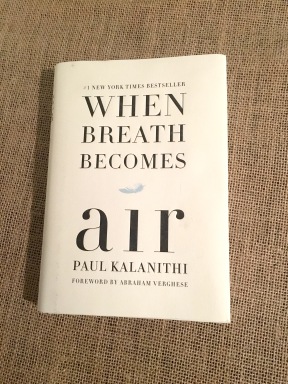In a word: Breathtaking

This book was a jewel. I read the whole thing in a day (which I never do). I cried through almost the whole thing (which I REALLY never do).
(A side note about the crying: I was seriously worried about myself after I kept my composure through the end of Me Before You, a book with the ending that had everyone else I know curled up on the floor in the fetal position. Dry-eyed, I finished the book on the evening of February 14, and announced to Stephen, “It’s official. I don’t have a heart.” He graciously responded, “It’s one of the many things I love about you.” Happy Valentine’s Day, right?
But I feel vindicated. I’ve been wanting to have a visceral reaction to a book ever since I learned from the What Should I Read Next podcast that it’s the thing to do while reading, and now I can join the club.)
So, on to the book. This is the story of a marriage cut short by the sudden death of the husband just after his fiftieth birthday. His death occurs in the first few pages, and the rest of the narrative alternates between the blissful past and the anguished present. (Although time moves forward in the “present,” and you walk with the author through her healing process, ending in a place of strength and hope.)
An Ivy League professor of literature, the author delivered a poem at President Obama’s first inauguration. Here, her poet’s voice is evident in her prose. Each chapter is a snapshot of a moment, and I loved Alexander’s reverent attention to detail. It feels like this book is a response to the inevitable blurring of memories that occurs after a person dies; it’s like each page is crystallizing the everyday details of courtship, marriage, family life, early grief that might otherwise be forgotten.
(I wish now that I had held onto the book long enough to write down a few perfect quotes to illustrate my point here. But I was in such a hurry for Leslie to read it, I passed it along before I made any notes. So…you’ll just have to take my word for it.)
I highly recommend this touching tribute to an extraordinary man and an inspiring love.

